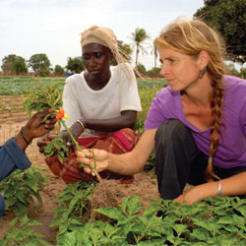Fairpensions, the Travel Foundation and Peterborough Environment City Trust (PECT) are shortlisted in the Animals and the Environment category for the Charity Awards 2010.
Fairpensions
Using shareholder power to bring about change
Fairpensions, part of Fairshare Educational Foundation, believes that if the corporate sector can be persuaded to act more responsibly towards the environment and society in which it operates, the beneficial impact will be huge. Therefore it seeks to influence behaviour by encouraging the fund managers who control the majority of shares
in companies to exercise their ownership rights responsibly.
Although significant progress has been made in the last 15 years, engagement has generally been secretive and conducted behind closed doors. Unlike in the US, shareholder resolutions at UK company meetings on social and environmental issues remain rare. Yet such occasions can be powerful opportunities to achieve change in company behaviour.
Fairpensions identified the environmentally damaging extraction of oil from tar sands as an issue which would lend itself to a shareholder resolution that could command real support both within the institutional investment world
and among the wider public. It co-ordinated resolutions to both BP and Shell’s annual general meetings, requiring them to answer questions about their involvement.
Louise Rouse, director of investor engagement, says the campaign has seen BP and Shell radically improve transparency on the financial and environmental risks of their project. “We attracted intense levels of media coverage, raising public awareness of the power of pension savings to influence corporate behaviour for the better. Over 5,000 people emailed their pension provider about our shareholder resolutions, and this powerful grassroots element of the campaign was crucial in catapulting tar sands to the top of the investment community’s
agenda in Spring 2010.”
Peterborough Environment City Trust (PECT)
Raising green standards
PECT aims to create a cleaner, greener and healthier Peterborough through a wide range of environmental projects. Combining awareness, education
and the enrichment of nature, its Greeniversity initiative encourages local people to share green skills with others including bee-keeping, gardening, cooking and knitting.
Greeniversity has kickstarted a green learning revolution in Peterborough, according to Nyree Ambarchian, PECT’s marketing and communications manager. Over 200 people have registered with Greeniversity since its launch in January and of those from whom feedback has been obtained, 92 per cent feel they have learnt skills that will allow them to live in a more sustainable way, while 83 per cent believe their confidence has been boosted.
Consistently outperforming its targets, it has laid a strong foundation to allow further growth and development of Greeniversity and the idea of informal adult learning,
as well as acting as a stepping stone for participants to access more formal learning opportunities.
In addition to helping to build a learning culture in Peterborough, it has developed local pride, strengthened communities and contributed to Peterborough achieving its ambition of becoming the UK’s environment capital.
One of the participants, Charmaine Lawrence, said: “Being green isn’t about hugging trees or going without, it’s about making the most of what you’ve got, being healthier, eating better, and thinking about quality of life rather than the quantity of things you own.”
The Travel Foundation
Changing the industry’s approach to tourism
In 2003, the year that the Travel Foundation was set up, a record 41.2 million overseas holiday trips were made by UK residents, compared with just 6.7 million in 1971. Tourism has the potential to benefit local communities and protect the environment. However, without careful planning and
understanding of the issues, it can have significant negative impacts. During the travel industry’s peak growth period sustainability was not a consideration for most companies.
And while growing awareness of environmental issues led to a rise in small, specialist eco-tourism operations, this reinforced the attitude that sustainable tourism was something only specialist operators could and should be concerned with.
A shift in attitude and action was needed right across the industry. The Travel Foundation was established with a unique focus on engaging travel companies in developing and delivering tourism that creates new local economic opportunities, protects the environment and promotes local culture. It has raised £5.7m from industry donations and has 24 industry partners, whose support has enabled the creation of over 30 sustainable projects in 16 destinations.
These projects have helped to create livelihoods and income for local people and provided best-practice examples for travel companies. Sue Hurdle, chief executive, says: “As well as engaging companies in initiatives to improve the wellbeing of destination communities and protect the environment, we have established a new funding source for projects which benefit thousands of people.









